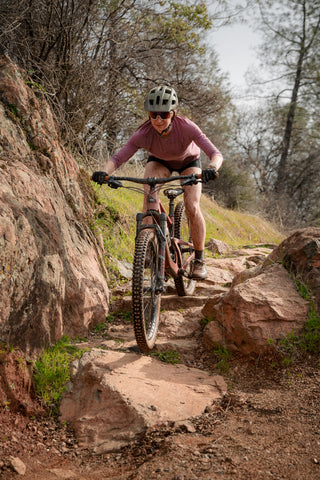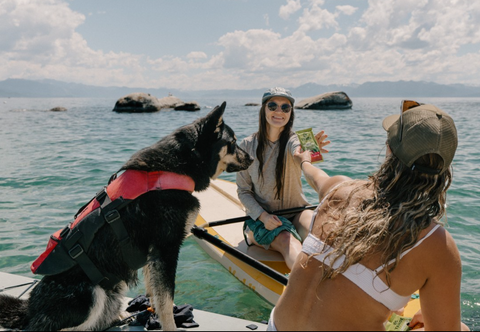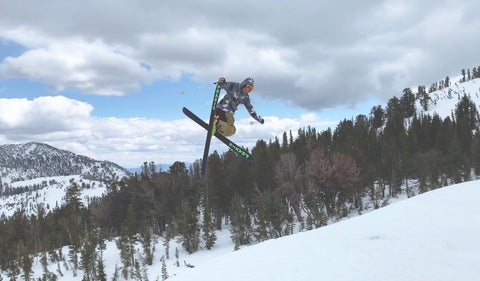
Picture this: you’re ten miles deep on an epic mountain biking trail. You’re surrounded by lush foliage and rocky terrain, zipping across the mountain, and getting that much-needed adrenaline rush that you only get while you’re out in the mountains and the fresh air.
But then, you lose control. You land a little too hard, or run over a sharp rock, or take a spill.
And now, your bike is in need of some serious repair.
If you brought all your essential gear and tools along with you, you can be back on the bike in no time. But if you haven’t brought your mountain biking essentials, this could mean the end of the trip and a long, stressful day making your way back to the trailhead.
Whether it’s a flat tire, a broken spoke, or scrapes and bruises, mountain biking can be unpredictable and dangerous when you’re not fully prepared for the ride ahead. Even the most skilled riders could experience some bumps in the road - which is why it’s crucial to take all the right necessities along with you.
Here’s the ultimate guide on everything you need to take on your next mountain biking adventure.
Essential Mountain Biking Gear

Packing all your mountain biking tools and gear will keep your ride running smoothly so you can spend more time enjoying the views. .
Your bike is the most obvious piece of equipment that you’ll need when you set out on a mountain biking ride. Just like any machine, it can be prone to mechanical issues, especially when you’re dealing with rough terrain, so you’ll need to have this gear on hand for any accidents you experience on the trail:
Pump
When you’re dealing with a leak or a flat tire, having a good portable pump is essential for getting back on the trail. Your bike pump should be portable to make it easy to carry around with you on your mountain biking trips. Consider using a CO2 inflator kit or a powerful mini pump for efficient and lightweight inflation.
Spare tubes
When you’re dealing with unpredictable and rocky terrain, your tires can experience quite a bit of impact and may take some damage. Even if you ride tubeless, it’s crucial to carry a spare tube (or preferably, two) for your bike in case of emergencies so you can make it back home safely. Make sure that the spare tubes you bring along are suitable for your tire size.
Patch kits
In addition to spare tubes, it’s also a good idea to carry a couple of patch kits and a bacon plug for your tires. This is especially if you’re going to be out on the trail for a while, or are dealing with an especially difficult trail that is known to be hard on bike tires.
Bike tools
You’ll also need a couple of bike-specific tools for any repairs you’ll need to perform while out on the trail. Some necessities include a wrench, chain tool, common hex drivers, wire cutters, and tire levers. Keep them organized and easily accessible in a tool roll or small bag. Even better, invest in a good biking multitool to save space and stay organized!
Lubricant
Always lube your chain before every ride (ideally the night before). Even still your bike chain might need some extra lubrication on your trip, especially if you’re dealing with any wet conditions like water crossing or rainy weather. Always keep a small bottle on hand as well as an applicator cloth to keep your bike running smoothly.
You may also want to keep some extra chains on hand in case of emergencies.
Duct tape
In a pinch, duct tape can be used for a wide variety of repairs like patching up a tire, patching your jacket, or mending a torn shoe.
Hardware
It’s always a good idea to keep spare bike hardware on you. Some essentials for common issues include a derailleur hanger, master links, and chainring bolts. A spare spoke or two might also come in handy on your journey.
Headlights
A bright, powerful light can be a literal lifesaver if you’re going out on a long or unfamiliar trail. Even if you don’t anticipate being out after dark, make sure your bike has a good headlight and taillight for visibility. You should also consider taking another light source like a headlamp when you know you’ll be in the mountains anywhere near nightfall.
First aid kit
When it comes to a sport as physical as mountain biking, accidents can and do happen, and you’ll want to be prepared for them. A good first aid kit should include some bandages, gauze, and antiseptic. You may also want to bring along some Benadryl to fend off an allergic reaction - being out in the middle of nowhere could expose you to poisonous plants and irritating bug bites.
Other Mountain Biking Necessities

Stay fueled, hydrated, and comfortable makes for a better adrenaline rush.
Of course, your bike itself isn’t the only thing you need to consider when you’re going out on a biking trip. You’ll also want to take your own safety and needs in mind!
Here are some personal items you’ll need while you’re out there in the mountains:
Helmet
Mountain biking can be dangerous, no matter how skilled you are, and a head injury can be devastating. So a helmet is absolutely non-negotiable when it comes to safe mountain biking.
Make sure that your helmet fits properly and always inspect it prior to any trips for cracks or damage.
Eye protection
Your bike will be kicking up lots of dust, debris, and rocks while you’re cruising around on those trails. You may also experience bright, direct sunlight in some areas of your trip that make it hard to see clearly. Bring along good eye protection like sunglasses to protect your eyes and increase visibility.
Weather-appropriate clothing
It’s always a good idea to be prepared in case the elements change. This is especially important if you’re going to be biking at higher elevations, where the weather tends to be unpredictable. Pack a light but waterproof outer shell like a rain jacket to be prepared for a sudden downpour.
You may also want to pack some coldproof accessories like windbreakers, a warm hat, and/or a spare pair of socks to keep your feet warm and dry.
Water
The importance of hydration cannot be understated, especially for physical activity as taxing as mountain biking. You should drink plenty of water and fluids prior to hitting the trail, then carry enough in a hydration pack or water bottle for the actual trip.
You might also consider using electrolyte supplements if your trip is going to be especially tiring for extra hydration.
Trail snacks
You should also carry some food for fuel, especially for longer rides. Some lightweight but nutritious options including jerky, nuts, trail mixes, plant-based supplements, and bars like Tahoe Trail Bars.
Sunscreen and lip balm
Mountain biking can be hard on your skin. You could be exposed to damaging UV rays, not to mention the dirt, dust, and wind that inevitably leads to chapped lips. Always use proper sun protection if you’re going to be out in the sun, and bring along some lip balm to keep your lips comfortable.
Toilet paper
You may need to use the restroom during your bike ride, so having toilet paper or wet wipes will probably come in handy. You could also use them for other purposes like cleaning grease and dirt from your bike during repairs.
Trail map/guidebooks
Venturing out into the backwoods and isolated mountain trails can be tricky, especially if it’s unfamiliar territory to you. Having a physical map and/or a guidebook on the trail can keep you moving in the right direction, even if the trail gets a little muddy or confusing along the way.
Cell phone
Even though for many, the purpose of a mountain biking trip is to get away from the electronics for a while, you should definitely still pack your cell phone. You can use it to pull up maps, utilize the GPS, and snap photos of the beautiful scenery around you.
Most importantly, as long as you have cell service, you can reach out to others in case of an emergency. If you go into remote territory for your mountain biking and adventuring often, it might be worth investing in a satellite phone or signal booster.
Money
You might not think of money as a necessity for venturing out into remote and uninhabited territory, but it’s always good to have some on hand just in case of emergencies. Cash is always best!
Other Considerations

There’s nothing quite like the feeling of a successful trip exploring the trails less traveled.
- You can carry all of your gear in a trail daypack, but you could also consider investing in a nice saddlebag and/or handlebar bag. This way, you can take a little bit of the pressure off of your back and strap your necessities directly to the bike itself.
- Take a friend or two along for the ride! There’s safety in numbers, and it’s always better to have company especially when you’re going on long or unfamiliar trails. This could also make it easier to carry all your gear since you can distribute the necessities among more riders.
- For the best preparation, research your trail thoroughly before you set out. Read reviews online and chat with others who have done it before. Word of mouth will give you a better idea of the kinds of obstacles you’ll face - and the potential impact they could have on your bike and your body.
Conclusion
Any time you leave the pavement, you’re heading into an adventure that could be equal parts thrilling and dangerous. Properly preparing by packing all of your biking and personal necessities can keep you safe and comfortable, so you can enjoy exploring, exercising, and fully appreciating those beautiful trails.
[a]https://unsplash.com/photos/u9iDLStoxyE
[b]https://unsplash.com/photos/1ow9zrlldJU
[c]https://unsplash.com/photos/pa0rr3rVB-U
[d]https://unsplash.com/photos/Qyj_AB5HcnY







